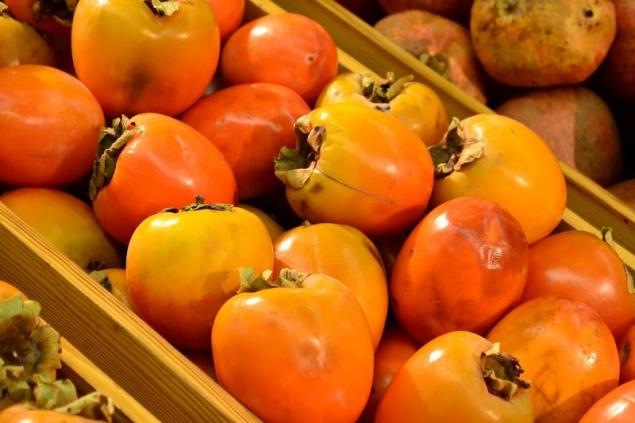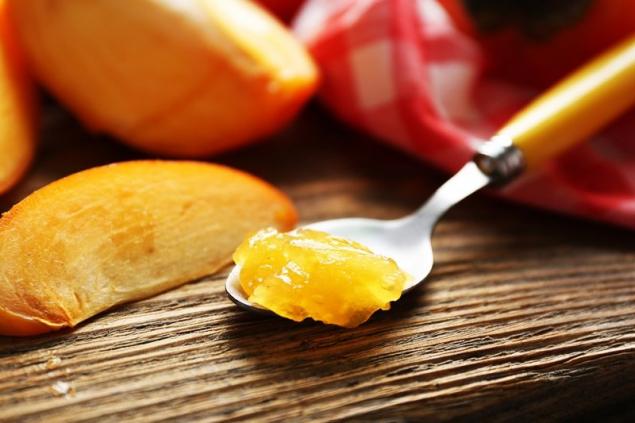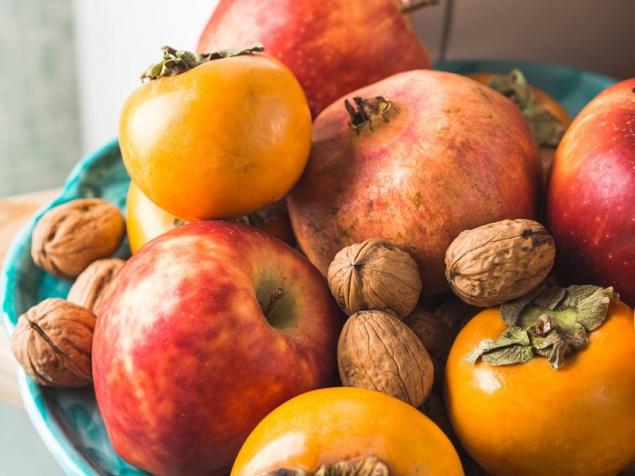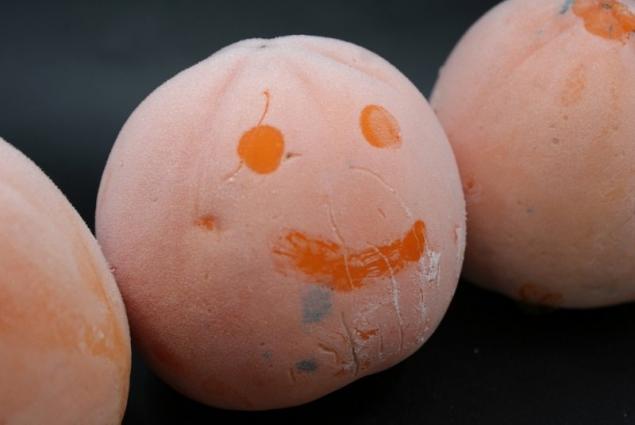166
Who should not use persimmon?
With the arrival of November, the last fruit of autumn appears on the shelves of stores - persimmon (Latin Diospyros). Sweet or tart-stringent “food of the gods”, as its name is translated from Latin, can really bring us true gastronomic pleasure.

DepositPhotos
This bright autumn fruit contains a huge amount of vitamins and trace elements, and is also incredibly useful for vision, lungs, heart and kidneys.

DepositPhotos
But, despite the numerous beneficial properties, persimmon can also seriously harm health. Especially in situations where unripe berries are eaten or when more than two berries are eaten per day.
Can I eat persimmon? Harmful health effects of persimmon It is associated mainly with a high content in immature fruits of the tannin substance. Tannin, or gallodubile acid, is a phenolic compound that has an astringent effect. The name comes from the French word tanner, which in Russian means tanning the skin.

DepositPhotos
The dimming effect of tannins is based on their ability to form strong bonds with proteins, polysaccharides and other biopolymers. In addition to persimmon, tannin is rich in black currant, kizil, cherry, rhubarb, kalgan root, quince and pomegranate. Tannin is also found in tea, cocoa and red wine.
When it hits the mucous membrane of the mouth or stomach, tannin reacts with the proteins of cell membranes, folding them and forming a tightening film. Hence the familiar astringent sensations.
In the specific environment of the stomach, tannin is able to form clusters of particles that cannot be digested. Doctors call such formations bezoars or "stomach stones". In some successful cases, these stones can resolve on their own, but sometimes surgery is required.

DepositPhotos
Large doses of tannin can lead to impaired digestion, liver or kidney dysfunction. Under the influence of this substance, irritation of the intestinal walls is possible. Excess tannic acid prevents the proper absorption of useful minerals, in particular iron, which is fraught with the development of anemia.
Tannin has the property of binding calcium in dairy products to insoluble precipitation, which over the years can cause the formation of stones in the gallbladder. Therefore, persimmon is not recommended to use with dairy products.

DepositPhotos
Interestingly, for the same reason, nutritionists do not advise eating strong tea containing tannin, cheese. It is better to use these products separately, and drink tea no more than two cups a day.
Who should treat persimmon with caution?
Now you know, how dangerous is persimmonBut that shouldn't make you give up the precious berry altogether. Everything is useful in moderation. If there is a predisposition to gastrointestinal diseases, then without health consequences you can eat no more than one fruit per day. In addition, you should not drink persimmon with dairy products.
Several ways to reduce the tartness of persimmon Tanin in large quantities is found in immature persimmon, which has an elastic and dense consistency. Such persimmon is more attractive externally and has a good commodity appearance, but often turns out to be inedible. You can get rid of excessive viscosity of persimmon, that is, from the excessive presence of tannin, in several ways.
The warnings associated with persimmon do not detract from its many useful properties. "Site" It will tell you what is so useful persimmon and what happens to your body when you eat this bright berry!
Another vitamin bomb of late autumn is quince. Tell us why it is so useful and what diseases it can cure. Now you won’t miss her in the market or in the store!

DepositPhotos
This bright autumn fruit contains a huge amount of vitamins and trace elements, and is also incredibly useful for vision, lungs, heart and kidneys.

DepositPhotos
But, despite the numerous beneficial properties, persimmon can also seriously harm health. Especially in situations where unripe berries are eaten or when more than two berries are eaten per day.
Can I eat persimmon? Harmful health effects of persimmon It is associated mainly with a high content in immature fruits of the tannin substance. Tannin, or gallodubile acid, is a phenolic compound that has an astringent effect. The name comes from the French word tanner, which in Russian means tanning the skin.

DepositPhotos
The dimming effect of tannins is based on their ability to form strong bonds with proteins, polysaccharides and other biopolymers. In addition to persimmon, tannin is rich in black currant, kizil, cherry, rhubarb, kalgan root, quince and pomegranate. Tannin is also found in tea, cocoa and red wine.
When it hits the mucous membrane of the mouth or stomach, tannin reacts with the proteins of cell membranes, folding them and forming a tightening film. Hence the familiar astringent sensations.
In the specific environment of the stomach, tannin is able to form clusters of particles that cannot be digested. Doctors call such formations bezoars or "stomach stones". In some successful cases, these stones can resolve on their own, but sometimes surgery is required.

DepositPhotos
Large doses of tannin can lead to impaired digestion, liver or kidney dysfunction. Under the influence of this substance, irritation of the intestinal walls is possible. Excess tannic acid prevents the proper absorption of useful minerals, in particular iron, which is fraught with the development of anemia.
Tannin has the property of binding calcium in dairy products to insoluble precipitation, which over the years can cause the formation of stones in the gallbladder. Therefore, persimmon is not recommended to use with dairy products.

DepositPhotos
Interestingly, for the same reason, nutritionists do not advise eating strong tea containing tannin, cheese. It is better to use these products separately, and drink tea no more than two cups a day.
Who should treat persimmon with caution?
- People with gastrointestinal diseases, as well as reduced activity of the stomach and intestines, irritable bowel syndrome. With adhesions in the intestine or constipation, since tannin can provoke an acute obstruction of the intestine.
- It is better to abandon persimmon with pancreatitis and diseases of the duodenum.
- People prone to fullness and rapid gain of excess weight, as persimmon can significantly slow down the metabolism.
- Persimmon is contraindicated in young children, but experts do not agree on the limits of age restrictions. Some pediatricians advise to exclude persimmon from the diet of children under three years old, others advise to give it to children only from 7-8 years old. It is best to resolve this issue individually for each child, consulting a doctor. The variety of persimmon also matters: it is better to buy fruits for a child with a lower content of tannins, without a tart taste.
421850
DepositPhotos - Pregnant and lactating mothers, because, like brightly colored fruits, persimmon can cause an allergic reaction.

DepositPhotos - People with increased sensitivity to iodine. In such cases, persimmon can cause harm, causing allergic reactions of various manifestations. Iodine allergy is more common in children, but in the case of an adult, it is much harder.
- In diabetes, excessive consumption of persimmon can provoke a strong jump in blood sugar.
- Persimmon lowers blood pressure. People prone to hypotension are contraindicated to use it in large quantities. But from 1-2 pieces will not be bad.
Now you know, how dangerous is persimmonBut that shouldn't make you give up the precious berry altogether. Everything is useful in moderation. If there is a predisposition to gastrointestinal diseases, then without health consequences you can eat no more than one fruit per day. In addition, you should not drink persimmon with dairy products.
Several ways to reduce the tartness of persimmon Tanin in large quantities is found in immature persimmon, which has an elastic and dense consistency. Such persimmon is more attractive externally and has a good commodity appearance, but often turns out to be inedible. You can get rid of excessive viscosity of persimmon, that is, from the excessive presence of tannin, in several ways.
- Immature persimmon should not be eaten immediately, it should be allowed to reach condition. To do this, it can be left to ripen for a couple of days in a warm room. To speed up this process, place ripe bananas or apples next to it. The gases released from these fruits will stimulate the maturation of persimmon and contribute to the decomposition of tannin in its pulp.

DepositPhotos - For 10-12 hours, keep persimmon in warm (30-40 degrees) water. Tannins, and therefore astringent taste, will go away.
- Tannin is destroyed when frozen, so frozen persimmon completely gets rid of tartness. If there was too much tannin in fresh fruits, their taste was unpleasant and astringent, after freezing this deficiency will completely disappear. This, by the way, will improve the taste of persimmon, make it sweeter.

DepositPhotos
The warnings associated with persimmon do not detract from its many useful properties. "Site" It will tell you what is so useful persimmon and what happens to your body when you eat this bright berry!
Another vitamin bomb of late autumn is quince. Tell us why it is so useful and what diseases it can cure. Now you won’t miss her in the market or in the store!

























